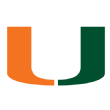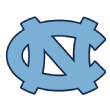You have to give the ACC Coastal this: It's not boring. It hasn't been all that good either, mind you -- its champion hasn't won the conference title game since 2010. In eight years, more Coastal champs have finished 50th or worse in S&P+ (three) than have finished in the top 20 (two). Still, when there's no dominant team, at least you end up with unpredictability. In five of the past six seasons, a team predicted fourth or worse in the preseason ACC media poll won the division. Last year's champ, Pitt, was picked fifth. Almost anything can happen here -- except what's actually supposed to.
That makes this season particularly intriguing because, well, nothing is "supposed to" happen. Miami will likely be the preseason division favorite, but we still don't know if the Hurricanes have a quarterback, and it would be hard for anything beyond "Georgia Tech, division champ" to surprise us much. So ... congrats in advance to the Yellow Jackets.
A quick reminder on terminology: S&P+ is the tempo- and opponent-adjusted efficiency measure I created at Football Outsiders in 2008.
Teams are listed below in order of S&P+ projections. Click here for the ACC Atlantic preview.
Jump to a team:
Miami | Virginia Tech | Virginia | Pittsburgh
North Carolina | Duke | Georgia Tech
Miami Hurricanes

2018 record and rankings: 7-6 (No. 27 in S&P+, No. 27 in FPI)
2019 S&P+ projection: 8.7 wins (No. 19)
2019 FPI projection: 8.2 wins (No. 27)
Strength: Havoc. Manny Diaz oversaw the most havoc-friendly, TFLs-heavy defense in the country last season. The Hurricanes were first in overall sack rate, third in stuff rate (run stops at or behind the line) and first in havoc rate (total tackles for loss, passes defensed and forced fumbles divided by total plays).
They lose a few high-level disruptors but still have end Jonathan Garvin, linebackers Shaquille Quarterman and Michael Pinckney and cornerback Trajan Bandy, and they added Virginia Tech end Trevon Hill. They're still going to spend a lot of time in opponents' backfields, even if Diaz is head coach instead of DC.
Weakness: The forward pass. Miami's defense ranked sixth in passing marginal efficiency last season. That would have meant much more had Miami's offense not ranked 115th.
New QBs coach and offensive coordinator Dan Enos could have a heckuva skill corps on his hands (running back DeeJay Dallas, receiver Jeff Thomas, Buffalo transfer K.J. Osborn and the latest batch of blue-chippers). But that matters only if a young QB of choice -- be it Ohio State transfer Tate Martell, part-time 2018 starter N'Kosi Perry or redshirt freshman Jarren Williams -- provides competence. Oh, and if a newly redesigned offensive line can protect him.
Opportunity: Life in the ACC Coastal. The Canes are projected 19th in S&P+ and 27th in FPI. That would be good for about sixth or seventh in the SEC West and fifth in the Big Ten East, but it's the best in the Coastal. Plus, perhaps the two biggest division threats (Virginia and Virginia Tech) have to come to Miami.
After the season opener against Florida, S&P+ projects Miami as at least a slight favorite in every regular-season game thereafter. That's with all the QB issues. Figure out how to be competent behind center, and this team might run away with the division.
Threat: Defensive depth. Defense is probably going to be this team's engine, and despite the star power still atop the depth chart, it has to be noted that Miami lost three of last season's top five linemen and four of six defensive backs. There's a balance between fostering an aggressive mentality and becoming dramatically all or nothing. With just a couple of injuries, Miami could find itself fielding a young, glitchy and big-play-prone defense.
Virginia Tech Hokies

2018 record and rankings: 6-7 (No. 55 in S&P+, No. 55 in FPI)
2019 S&P+ projection: 8.3 wins (No. 30)
2019 FPI projection: 8.4 wins (No. 32)
Strength: Experience. What does it take for Bud Foster to field a mediocre defense? A spectacular cocktail of youth and attrition. The 2018 Hokies' defense had to replace its top five linebackers from 2017, plus five of its top six defensive backs. Four starters missed time with injury. Plus, a decent line lost end Trevon Hill to dismissal just as he looked like he was ready for a breakout season.
In college football, though, when you deal with a season of massive attrition such as that, you probably reap the benefits the next year. Seventeen Hokies recorded double-digit tackles last season, and 15 are back in Blacksburg this fall. The defense is loaded with sophomores and juniors instead of freshmen and sophomores, and after nose-diving to 77th in defensive S&P+, the Hokies should expect to rebound into at least the top 40.
The offense, by the way, boasts outstanding experience in the passing game. Senior quarterback Ryan Willis took over for the injured Josh Jackson early in 2018 and was at least decent, and he has four of last season's top five pass targets back, including big-play weapons Damon Hazelton and Tre Turner.
Weakness: Big plays. Opponents were probably making more of them than Tech was last season. In 13 games, Tech enjoyed 27 gains of 30-plus yards, 69th in FBS. But the defense allowed 42. Only Georgia State and UConn allowed more. Big plays produce easy points, and Tech's dreadfully young and glitch-prone secondary made sure that opponents scored more easy points than VT did.
Opportunity: A soft early schedule. Tech begins the season at Boston College, which isn't a gimme by any stretch, but the Hokies are still likely favorites. According to S&P+, they are double-digit favorites in four of the five games that follow. After last season's somewhat sour 6-7 season, Tech should be 6-1 or 5-2, with bowl eligibility all but clinched, when the Nov. 2 trip to Notre Dame pops up on the schedule. Positive vibes.
Threat: Both S&P+ and FPI grade three Coastal teams ahead of the pack: Miami, Virginia Tech and Virginia. The Hokies have to play at both Miami and UVA. Granted, the last time UVA beat its in-state rival, George W. Bush was in his first term. But that's still pretty daunting.
Virginia Cavaliers

2018 record and rankings: 8-5 (No. 42 in S&P+, No. 42 in FPI)
2019 S&P+ projection: 7.6 wins (No. 41)
2019 FPI projection: 7.4 wins (No. 43)
Strength: Pass defense. In his 14 seasons as a head coach at BYU and Virginia, Bronco Mendenhall teams have ranked in the Def. S&P+ top 40 eight times. His Cavaliers improved to 31st last season, and there's no reason to think their growth will stop this fall. The pass rush needs a bit of retooling, but most of the main pieces in run defense are back, and the secondary could be terrifying.
The primary reason for that: Bryce Hall. Hall once signed with UVA over offers from the likes of Coastal Carolina and New Hampshire, but he has turned into one of the nation's best cornerbacks. Hall defensed (intercepted or broke up) 24 passes last season, and junior Darrius Bratton added another seven. With studs on the outside, defensive coordinator Nick Howell can have some fun with safeties Joey Blount and Brenton Nelson. UVA was seventh in completion rate allowed and 17th in passing marginal efficiency in 2018. Expect those numbers to stay the same or improve.
Weakness: Easy points. There are basically two ways to score touchdowns: big plays and strong red zone execution. Virginia's offense was pretty efficient overall (30th in marginal efficiency), but the Cavaliers produced minimal explosive plays (18 gains of 30-plus yards, 118th in FBS), and their efficiency dried up as they got closer to the goal line. They ranked 91st in success rate inside the 10 and 121st on first-and-goal. The result was a lot of unnecessary field goals and a handicap in close games (they were 1-3 in one-possession finishes).
Just a few more easy points could have produced a 10-win season.
Opportunity: Again, pass defense. Miami still might not have its QB situation figured out. Duke is without Daniel Jones. Georgia Tech is dramatically changing its offense. North Carolina will be starting a youngster. Virginia Tech and Pitt are the only two Coastal foes with any sort of stability at quarterback. That makes it sound like a pretty good time to have a dynamite pass defense, yeah?
Threat: A midseason gauntlet. UVA plays only five road games, but four come in a five-game midseason stretch. The Cavaliers play only one home game between Sept. 21 and Nov. 9, and the first two road games in that span come against Notre Dame and Miami. This set of games will tell us everything we need to know about UVA's depth and resilience.
Pittsburgh Panthers

2018 record and rankings: 7-7 (No. 61 in S&P+, No. 49 in FPI)
2019 S&P+ projection: 5.9 wins (No. 59)
2019 FPI projection: 6.7 wins (No. 48)
Strength: Random explosions.
Weakness: Inefficiency. We'll combine these two. The Coastal division was flawed enough in 2018 that Pitt was able to win it despite being decent for only about half the season. Pat Narduzzi's Panthers went 5-1 between Oct. 6 and Nov. 17 but went just 2-6 otherwise, losing big to Penn State, UCF, Miami and Clemson.
Their full season stats, then, did not bely that of a division winner. Really, the only thing that stood the test of time was the Panthers' run game ... which is now without backs Qadree Ollison and Darrin Hall (combined 2,357 yards and 21 touchdowns) and four-fifths of last season's starting line.
The addition of offensive coordinator and occasional QB guru Mark Whipple could do great things for junior Kenny Pickett, but it's really hard to go from the bad end of the efficiency and consistency scale (Pitt was 116th in passing marginal efficiency and 87th in completion rate) all the way to the good end in a single offseason.
The good news, though, is that Pitt still has big-play potential. Leading returning receivers Maurice Ffrench and Taysir Mack combined to average 17.9 yards per catch last season, and both found a steadier rapport with Pickett late in the season. Plus, youngsters such as running backs Mychale Salahuddin and receiver Shocky Jacques-Louis appear to have high-end athleticism.
Efficiency is the biggest predictor of success in football, and Pitt probably won't have it, but big plays can make you randomly scary, at least.
Opportunity: Defensive culture. After fits and starts under Narduzzi, Pitt's defense has been far sounder the past two seasons. With the major components of a solid pass defense back -- pass-rushers Rashad Weaver and Patrick Jones II, corners Dane Jackson and Jason Pinnock, safeties Damar Hamlin and Jazzee Stocker, blue-chip youngster Paris Ford -- a decent step forward is possible in 2019. This might be a sign that the culture Narduzzi has been attempting to build is taking hold, and if that happens, a repeat in the Coastal isn't particularly far-fetched.
Threat: The snowball effect. Pitt's schedule isn't horrible by any means -- the Panthers avoid Clemson, Florida State and NC State in cross-division play and get Miami and Virginia at home. Still, they have only one sure win on the schedule (Delaware), and they are, per S&P+, projected underdogs in seven games. Early home losses to UVA and UCF could trigger quite a challenging fall.
North Carolina Tar Heels

2018 record and rankings: 2-9 (No. 88 in S&P+, No. 77 in FPI)
2019 S&P+ projection: 5.1 wins (No. 61)
2019 FPI projection: 5.4 wins (No. 54)
Strength: A potentially great run game. Granted, new offensive coordinator Phil Longo likes to throw the ball as much as possible, but if he chooses to adapt a bit to protect a freshman quarterback -- either true freshman Sam Howell or one of two redshirt freshmen (Cade Fortin or Jace Ruder) -- this run game could be a nice asset.
The RB trio of Antonio Williams, Michael Carter and Javonte Williams returns after combining for 1,325 yards (6.1 per carry), and the line boasts five players with starting experience, including two-year starting tackle Charlie Heck.
Weakness: A potentially awful run defense. UNC was at times successful in pass defense last season, but the run defense was an abomination from start to finish. The Heels gave up at least 4 yards on 50% of non-sack carries (110th in FBS) and stuffed opponents at or behind the line just 16% of the time (105th).
Injuries and depth were a massive problem for the front seven last season, but with six 2018 contributors gone from the line and linebacking corps, you can't automatically assume that this year's unit is going to be any deeper. Creative new defensive coordinator Jay Bateman should have a lot of fun with nickel Trey Morrison and the DBs, but he'd have more fun if opponents actually had to pass.
Opportunity: The element of surprise. Say what you will about the Mack Brown hire -- and I have -- but this team boasts a lot of experience, and Brown's staff seems to possess a good amount of young, creative energy. UNC's schedule is brutal out of the gates, with games against South Carolina and Miami (both projected in the top 30), followed by a trip to Wake Forest and visits from Appalachian State and Clemson.
An 0-5 start is on the table, but an optimist might say that a mostly unscoutable UNC team could pull off an upset of the Gamecocks or the Hurricanes, then ride confidence to toss-up wins over Wake and Appalachian State. As expected, Brown is recruiting well so far, and his first Heels team will at least have a chance at a 3-1 start and decent hype heading into the Clemson game. That could seal the deal with a few more recruits, even if reality strikes later in the season.
Threat: The element of surprise is harder to spring with a freshman QB. That probably goes without saying.
Duke Blue Devils

2018 record and rankings: 8-5 (No. 51 in S&P+, No. 43 in FPI)
2019 S&P+ projection: 5.4 wins (No. 65)
2019 FPI projection: 5.3 wins (No. 56)
Strength: Tilting the field. It wasn't the most exciting life, but Duke's largest statistical advantage in 2018 came primarily from field position. The Blue Devils enjoyed an advantage of 5.5 yards per drive over their opponents, and it was instrumental in two close wins and last season's 8-5 record.
Better yet, they achieved this advantage in a reasonably replicable way. Quarterback Daniel Jones, now with the New York Giants, didn't post stats that his replacement (probably senior Quentin Harris) can't replicate. He simply caught up to the chains on second-and-long, then converted third-and-medium. Even if Duke ended up punting, it was usually after a couple of first downs. On defense, the Blue Devils would either get a quick stop or give up points and take over after kickoff. Voila! Sustainable field position advantage!
Weakness: A front six that doesn't push back. Imagine how successful the Blue Devils could have been if they had anybody in their front six who could make key plays at key times. Duke forced passing downs well but ranked just 129th in passing downs sack rate, giving opposing QBs time to find an open man. The Blue Devils also bombed in the red zone: They were 129th in success rate allowed inside their own 10 and 128th on first-and-goal.
This was a pretty young and banged-up unit, though. The top two linebackers were hurt a lot, and there were five freshmen and sophomores among the top seven tacklers on the line. Development from ends Victor Dimukeje and Chris Rumph II could solve the pass-rush problem, at least.
Opportunity: Road maturity. Duke went 4-2 on the road last season, with losses only to the two ACC division champions. The Blue Devils won at Wake Forest and North Carolina in 2017 too. They tend to play with maturity and control. That's good because they face a lot of road toss-ups this season: MTSU, Virginia Tech, Virginia, UNC and Wake Forest. Go 3-2 or 4-1 in those games, and they're likely still in the division race well into November. (Go 1-4, and they might not make a bowl.)
Threat: So much offensive turnover. A lack of continuity in the passing game is a strong predictor of drop-off, and Duke has absolutely no continuity. Jones' production might have been replaceable, but both he and last season's top four targets are gone. The run game is experienced and potentially explosive, at least.
Georgia Tech Yellow Jackets

2018 record and rankings: 7-6 (No. 74 in S&P+, No. 39 in FPI)
2019 S&P+ projection: 3.7 wins (No. 89)
2019 FPI projection: 3.7 wins (No. 82)
Strength: The ground game. New Tech head coach Geoff Collins brought offensive coordinator Dave Patenaude with him from Temple. Patenaude seemed to adapt reasonably well to what his personnel had to offer, passing the ball quite a bit last season because, well, Temple was better at passing than running.
Patenaude's first Tech offense will be better at running. That is almost assured. The QB of choice (passer Lucas Johnson? Option leftover Tobias Oliver? Redshirt freshman James Graham? True freshman Jordan Yates?) is going to be inexperienced, dealing with a massive change in system going from Paul Johnson's option attack to this or both.
The Yellow Jackets are still going to have Jordan Mason, Jerry Howard and Nathan Cottrell in the backfield, though. This trio of backs combined for 1,585 yards (6.1 per carry) and 16 touchdowns last season.
Weakness: Change. So much change. Rarely will a team undergo as much transition as Tech is experiencing this offseason. Obviously, going from option to non-option will always be a pretty big jolt in and of itself, but Tech will also be dealing with a quarterback change on offense and the loss of last season's top four linemen, top linebacker and three of five defensive backs. Collins is an energetic guy with a creative streak, but there's going to be a lot of experimentation -- too much, perhaps, to also field a good team.
Opportunity: Low expectations. S&P+ projects Tech to fall to 89th this season, FPI to 82nd. Both systems project 3.7 wins, which is pretty jarring for a program that has won fewer than five games in a season just once in the past 24 years. But coaches love playing the "nobody believes in us!" card, and Collins' energy and willingness to throw stuff at the wall and see what sticks could produce a loose, enjoyable team capable of an upset or two.
Threat: Morale. The season begins with a Week 1 ritual sacrifice at Clemson. Maintaining composure after that might be difficult, and moving on quickly will be important, as the two most likely wins on the schedule (USF and The Citadel) come in Weeks 2 and 3. Lose either of those, and you're looking at a long slog of a season, one in which "creativity" and "willingness to try different things" turn into "we have absolutely no idea what might work."
